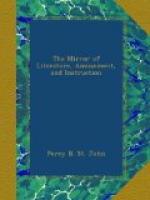P.T.W.
* * * * *
MIDNIGHT—A TOUCH AT THE EPIC.
(For the Mirror.)
“The iron tongue of midnight hath toll’d twelve.” SHAKSPEARE.
Amid the pauses of the midnight storm,
When all without is cold, within all warm!
Amid the pauses of the midnight blast,
When ev’ry bolt and ev’ry
sleeper’s fast!
In that dire hour, when graves give up
their dead,
And men for once agree in their pursuit—a
bed!
When heroes, statesmen, senators, and
kings,
Lords, and et ceteras of meaner things,
Forget the road to fortune—or
to jail,
And Morpheus all their equal guardian
hail!
When each forgets each ’vantage
or mishap.
And all are equal in one common nap!
At that dread hour...
Caetera
desiderantur.
Carshalton W. P——n.
* * * * *
ON OATHS.
(For the Mirror.)
Since lately we have had a great deal of prevarication in our courts of justice about receiving the oaths of deists, &c., I have thought it meet to furnish the MIRROR with an account of the first usage of the words, “So help me God.” The word oath is a corruption of the Saxon eoth. An oath is called corporal, because the person making an affidavit lays his hand upon a part of the scriptures.
At the conclusion of the oath the above words are used, which may perhaps have originated in the very ancient manner of trial by battle in this country, when the appellee, laying his right hand on the book, takes the appellant by the right hand with his left, and maketh oath as follows:—“Hear this, thou who callest thyself John by the name of baptism, whom I hold by thy hand, that falsely upon me thou hast lied; and for this thou liest, that I who call myself Thomas by the name of baptism, did not feloniously murder thy father, W. by name, so help me God.” (Here he kisses the book, and concludes,)—“And this I will defend against thee by my body, as this court shall award.” And the appellant is thus sworn also.
Here, it may be observed also, the true foundation of the word lie, being esteemed still so great an affront above all others, as whenever it is pronounced to cause “an immediate affray and bloodshed.”
I have seen people sworn in poetry; and certain it is, that in many countries in Europe the making of oaths differs. I have some curious specimens of ancient oaths, some in Latin prose, others in poetry.
Lord Chief Justice Coke was so strict with regard to the receiving of oaths, that when at Cambridge Summer Assizes, upon a trial of felony, he said, “in case of trespass, although it be only to the value of twopence, no evidence shall be given to the jury but upon oath, much less where the life of a man is in question.” An action may be brought on the case upon a man calling another a perjured man, because it shall be intended to be contrary to his oath in a judicial proceeding.




